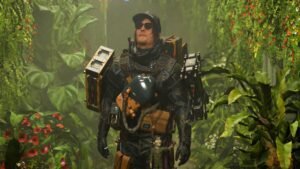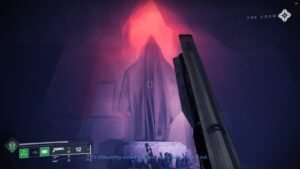Music is one of my favorite parts of a game. I will pause and spend time in areas that have a beautiful track. I will go back and replay areas with beautiful effects. Sure, I love the gameplay and will wax lyrical about it, but a lot of my emotion and connection with my favorite moments in games tie into the music there too.
It’s no surprise then that I love rhythm games or that I work with the background music of a game score Spotify playlist. But as much as I love the music, the process of how it is made or composed was a complete mystery to me. That is, until I recently got the chance to talk to Théo Nogueria about his work as Audio Director and Composer for SnowCastle Games’ Ikonei Island.
Theo is also the co-founder of GAiN (Game Audio in Norway), a member-based interest organization revolving around music and sound for games and other interactive media. They serve as a source of information and mentorship/support while also being a place to network.
I jumped at the opportunity to ask Theo about the annual Game Audio Conference to understand how it contributes to GAiN’s mission, as well as to understand his role, how it contributes to the game development pipeline, and some of the challenges in crafting the amazing soundscapes we all play in. It was incredibly wonderful and illuminating to talk to someone who is not only passionate about Game Audio, but who also loves mentoring within that space.
It is with a great pleasure that we at Game Audio in Norway announce the dates for GACO 2023!
Tickets will go for sale sooner this year, as well as guest announcements coming soon!#gameaudio #gamemusic #gaco pic.twitter.com/La2YUfou0c
— Game Audio in Norway (@GAiNorway) April 24, 2023
What do you do as an audio director?
Théo: Since we are a very small team, I do everything with regard to audio for Snowcastle. This includes making sound effects, creating the ambiance, voice-over directing, and music composing and implementation.
What is something that is exciting and cool in your role?
Théo: When you are a creative person, it can be a little tricky to find inspiration when sometimes you don’t have any. You are just forced to find inspiration and create something memorable all the time. But in this role, I’m part of all the sides of audio. It gives me the possibility of switching tasks when I am stuck. If I can’t come up with something when composing, I can just move to voiceover. Or I can move to something technical like implementation. This is definitely something that has always appealed to me.
Even when I was a freelancer, I had this flexibility. I never wanted to just specialize in one thing. The ability to move to completely different tasks isn’t just a break, it can also give me inspiration for the original task I was stuck on. After all, the whole audio system is connected, and this is the best part of the role.
Not only that, but game audio is much more connected to game development than music or soundtracks as we know it, in general. It’s what a lot of people don’t understand. If you come in from composing for movies or another musical career, you have to almost start from scratch technically. Some of the creative things you can still do but you have to change the way you look at music. But if you enjoy game design, you can quickly break down, understand, and enjoy the various aspects of game audio.
Interviewer’s note: When you compose or design sound effects for a movie through a process called Foley, you only have to think of a single use for that sound — how it is getting used in that moment that the director has chosen. The composer/foley artist creates the sound and any transitions for the footage as it has been shot, to evoke the specific emotion you need. However, a game is a live space. Outside a cinematic, you need to consider every way a player might encounter the sound or a music track, based on their actions, and create for that. When it comes to the themes or tracks for a space, you also need to consider how to randomize the music within a theme to prevent repetitiveness. You can get a glimpse of how Theo does this in Ikonei Island.
For those who are interested in entering Game Audio — what does your workflow look like? What are some of the details they will need to pay attention to or understand?
Théo: There are many facets of game audio, and each will have its own thing that you need to pay attention to. But one thing everybody needs to know and learn is game logic (how the game is built/structured and how it works). So that you understand how things work and how they function. That way, you will be able to make something that works with the game.
Based on the kind of game, you need to understand what kind of music or effects you need to make so that they actually fit in the game and can adapt to player action and sync with the animation. For instance, one long play of music can go out of sync where the player can do a lot.
You also need to consider that by learning game logic, you have to learn the tools. You need to be able to make a game so that you can implement the music. At Snowcastle, the team goes directly into the game engine to do so. A big step outside of just making music.
I recently gave a talk on the same topic in Malmö, Sweden at the Nordic Game Conference, about the usage of audio middleware like FMOD and Wwise (software that facilitates the implementation of sound into games). Because there are cases where you want to use it, and others where you don’t. However, these are tools that every game audio designer should know anyway. Understanding how it works is a basic part of the implementation. It’s also a lot easier to start with than just jumping into an engine because the audio systems within a game can get very complex. It’s something you need to know even if you aren’t going to be implementing the sound yourself.
As I said, forget everything you know about film and TV and other linear media. Sure, cinematics are linear but everything else is adaptive. Instead, you have to constantly think about what the player can do and design for that. With music: How is a piece going to impact the player? Could it get too loud or too boring or too repetitive? How can you create variations? These are the kinds of things you have to think about.
To Foley: ‘What if they move this way? How should this sound? What about another action? How will the sound be impacted? What is the difference between stepping on stone and stepping on sand? Do you need variations to be realistic?
Considering all this complexity but amazing potential, what is something you want to do or create that you haven’t had a chance to yet? Even with all your varied experience?
Théo: Oh, I would love to go crazy and build a layered system where you could play the music for 80 hours and it never repeats itself. To create a procedural system for composed music. The implementation of this is something I have been researching, to use a lot of short pieces of orchestral music and put it into a generator. It’s a challenge not only because of the implementation but also composing something that will fit together while having a lot of different instruments.
That would create an amazingly varied game if the music could change to that degree!
Théo: Yeah. I recently saw a podcast interview with Austin Wintory and Chance Thomas, when Chance talked about his last score for The Settlers before he retired (not something a composer usually does). What is amazing is that this is something he actually did. He created a very complex procedural system with 16,000 audio recordings of mostly acoustic guitars. It’s funny because I was already planning, brainstorming, and testing to create a procedural system. When I saw this, I was like, OK, I’m on the right track. This is exactly where I want to get, but a little bit different. This is definitely a path that many Game Audio designers are exploring, and it will be interesting to see how it comes up in games.
Which game or composer has done some cool music/effects that you think are worth checking out?
Théo: I think that the audio design and music for the Horizon series by Joris de Man and his team are amazing. There were many times when I stopped in the game to just listen to the world, which is something I do rarely. A lot of games don’t really hit me that way. As much as I enjoyed Aloy and the game, the music had a great impact on me. Specifically in Forbidden West, when we meet the Utaru and their chorus echoes and changes through the game. Not only is it cool and immersive, but I also loved the fact that I couldn’t spot the transitions in how it came up. It’s something that is different, and I would love to achieve something of that level. It’s very emotional because the chorus changes based on what is going on in the story.
Yeah, especially at the end of the Second Verse mission, where the machines sing along too. It’s a wonderful harmonization between human voices and metallic sounds. What has been your experience with creating soundscapes that have to mix recognizable music voices with inorganic/metallic sounds?
Théo: Yeah, I’ve done that for previous soundtracks. It’s what we call a hybrid score, where we mix synths and sound design with acoustic instruments. This is something I love to do. But it doesn’t fit with Ikonei Island. I am definitely looking to see if it can be a part of Earthlock 2. Not as sci-fi-ish as some of the other ones I worked on. Like the soundtrack I did for Amber Sky 2088 was very synth-heavy.
If we could just switch gears a little, can you tell me about GAiN and the Game Audio Conference?
Théo: Sure. Game Audio in Norway started as a Facebook group back in 2009, put together by the 4 people who were working with Audio in the Norwegian game industry at that point. However, we registered as an official organization in 2021. Since then, we have been working towards creating a proper copyright system for music and games with the performing rights organization in Norway. We are also working to help and be a resource to our members and non-members who join our community through Discord and social media. We’re working with software companies and people to do things that can improve everybody’s workflow.
We also plan events and host a conference, GACO. We are very proud of it because there aren’t a lot of game audio conferences in the world. 2023 will be the 3rd year we are running GACO. We wanted to create something where we can bring cool guests to Norway, to present anything in the game audio field. It’s also a great opportunity to network and see/talk about innovations. We already have some really cool guests already lined up, the details of which can be found on our website. As the program gets updated, it will get posted on all of our socials. Some special guests were invited, such as Lena Raine, but others were part of a submission process where we look for talks that would be interesting to us.
The conference is both physical and live-streamed. The tickets for both are available on our website. GACO is our way to spread the knowledge and joy of working on Game Audio.
GACO 2023's first speaker announcement!? @kuraine an award-winning composer and producer
She has written original soundtracks for; Celeste, Minecraft and many others!
She will be discussing her history with Game Music, how it informs her creative process#gameaudio #gamemusic pic.twitter.com/J6NkTAYogZ— Game Audio in Norway (@GAiNorway) July 25, 2023
Is GAiN just for people who are already in the industry, or do you also support educational endeavors?
Théo: No, we have a lot of students. We have a lot of people that are considering starting in the industry and they reach out with questions on the Discord server. Those of us in the industry try to answer those as best as we can and then open discussions. The discussions are super helpful as it allows us the opportunity to teach and mentor. One of our immediate goals is to create a fact sheet on our website that answers many of these basing questions about starting in the industry. From tips and tricks to software you should learn and what kind of fees/salaries you should look for.
From what I’ve seen online about the conference and about the group, it’s not just Norway, right? It’s about creating a worldwide community, even though you are based out of Norway.
Théo: Yes, correct. We are still a regional organization, but we are opening up. We want anybody from anywhere to join by either coming here physically or joining via live stream. We are also connecting with other organizations. Since it isn’t official, I can’t give too many details, but we are joining forces with other organizations like ours in other parts of the world. To figure out what we can do in collaboration with each other and to create a connected network. The conference is a part of those efforts, and we will support our partners in hosting their own events or conferences. It’s about creating a network to teach and grow together.
GACO 2023 will be on Thursday, September 21st, and Friday, the 22nd, from 10:00 AM to 5:00 PM Norway time. Tickets are currently available on the website.
If you are interested in Game Audio as an enthusiast or as a career, GAiN and GACO are excellent resources to learn more about Game Audio and to meet industry professionals and other enthusiasts. For more information, do check out their social media channels. However, if you want to join the discussion and find mentorship or even learn more, their discord server is open for everyone. As a member, you will also get access to special channels where you can get special discounts on software as well as other perks.
Snowcastle Games’ Ikonei Island is available in Early Access on Steam.





